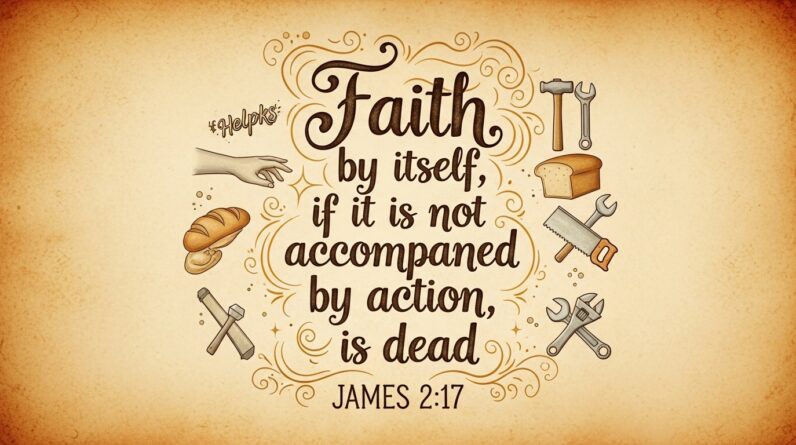Living Generously: Applying 2 Corinthians 9:7 In Everyday Giving
You want to live a life marked by generosity — not because someone told you to, but because your heart is changing. Generosity is more than a transaction; it’s a posture of trust, worship, and celebration. This article walks you through practical, spiritual, and everyday ways of applying 2 Corinthians 9:7 so your giving—whether money, time, or encouragement—flows from a joyful heart. You’ll get biblical grounding, practical steps, and real-life examples so generosity becomes a habit, not a burden.
What 2 Corinthians 9:7 Actually Says
You might know the verse by heart: “Each of you should give what you have decided in your heart to give, not reluctantly or under compulsion, for God loves a cheerful giver.” For context and study, read it here: 2 Corinthians 9:7. Paul isn’t giving you a legal checklist. He’s describing the attitude God delights in: voluntary, heartfelt generosity. The emphasis is less on the amount and more on the spirit behind the gift.
Why the Heart Matters in Giving
When you give, what matters most is your heart. You can give a lot and still miss the point if your heart is proud or begrudging. Conversely, a small, sincere gift from a willing heart pleases God greatly. The Bible links generosity to the condition of the heart repeatedly, and that’s because generosity is primarily spiritual. It tells God, “I trust you. I care about others more than my comfort. I’m part of your story.”
The Broader Biblical Picture of Generosity
Paul’s instruction in 2 Corinthians fits into a long line of biblical teaching about giving. Jesus taught, “Give, and it will be given to you” to underline a principle of sowing and reaping in the spiritual and practical realms—see Luke 6:38. The early church modeled radical generosity in Acts, and Paul himself reminded believers that it is more blessed to give than to receive: Acts 20:35. All these passages shape a vision of giving that’s joyful, communal, and God-centered.
The Heart of Giving: Cheerfulness
Cheerful giving is a spiritual muscle you develop. When God “loves a cheerful giver,” He’s responding to your attitude, not just your bank account. Cheerfulness in giving means you don’t calculate grudgingly or give under pressure; you give as an act of worship and trust. The aim is that giving becomes a reflection of God’s generosity toward you — not a duty but a delighted response.
Applying 2 Corinthians 9:7 in Financial Giving
When you’re applying 2 Corinthians 9:7 to your finances, the goal is to align your wallet with your worship. That means deciding ahead of time to give, planning your generosity, and doing it with gladness rather than reluctance. Start by praying and asking God to show you an amount and frequency that reflects both faith and wisdom. Then commit it in your budget so the giving becomes intentional, not accidental.
Practical Steps for Budgeting Generously
You don’t have to be wealthy to be generous; you need a plan. Begin with these steps: set a giving percentage, schedule automatic gifts, and allocate a portion for spontaneous generosity. These steps turn impulse into habit and free your heart to give cheerfully. If you want a biblical parallel for planned generosity and faith, consider reading Malachi 3:10, which challenges you to trust God with your resources.
Giving Without Pride or Publicity
Jesus warned against giving for show in Matthew 6:1-4. When you apply 2 Corinthians 9:7 to finances, check your motives. Are you giving to be noticed or to honor God and help others? The healthiest generosity is both private and joyful — you don’t need a trophy for obedience. Humility keeps your giving clean and spiritually sweet.
Applying 2 Corinthians 9:7 in Time and Service
When you’re applying 2 Corinthians 9:7 to your schedule, you realize time is a form of currency. Serving at church, volunteering in your neighborhood, mentoring a young person — these are all ways to invest your life for kingdom impact. Intentional service means you choose to make sacrifices so others flourish. The principle is the same: decide in your heart, don’t serve reluctantly, and serve with joy.
Scheduling Your Generosity
Treat service like a recurring appointment with God. Block out hours on your calendar for ministry, visiting the sick, or helping a neighbor. When your calendar reflects generosity, you won’t accidentally let busyness steal your good intentions. Scheduling also helps you say “no” to lesser things so you can say “yes” to the most important acts of service.
Serving Without Burnout
Generosity of time can lead to burnout if you don’t care for yourself. Apply the same wisdom here as in financial giving: be intentional about how much you commit. Remember Jesus’ rhythms of work and rest. Giving joyfully means giving sustainably, so you can keep giving for a lifetime without losing your own spiritual health.

Applying 2 Corinthians 9:7 in Encouragement and Presence
You give more than money: you give presence, affirmation, and hope. A quick text, a listening ear, or a heartfelt word can be as generous as a check. When you’re applying 2 Corinthians 9:7 to relationships, decide to encourage without being forced, speak life without calculation, and be present without distraction. You’ll communicate love and worth to people who need it most.
The Power of Small Acts of Kindness
Small, consistent acts of kindness build trust and heal wounds. Imagine making it your rule to send one encouraging message each day, or to notice the person who’s been quiet and ask how they are. These tiny investments compound into deep relationships. Biblical generosity includes the way you treat people on the margins and in the mundane moments.
Overcoming Obstacles to Joyful Giving
You’ll face obstacles: fear, scarcity mindsets, envy, or simply busyness. Each of these can choke the generosity God calls you to. Identify the specific block in your life—maybe it’s worry about tomorrow or comparison with others—and take practical steps to address it. Scripture offers remedies: trust God’s provision, practice gratitude, and remember that you’re steward, not an owner, of what you have.
Biblical Answers to Common Fears
If you fear you won’t have enough, meditate on God’s promises and past faithfulness. Read stories like the widow who trusted God even when resources were scarce and saw His provision (see Mark 12:41-44). If pride tempts you, return to a posture of gratitude and confession. If busyness distracts you, simplify and prioritize what truly matters.
The Ripple Effect of Cheerful Giving
When you give cheerfully, you set a pattern that influences others. Your family watches. Your friends take cues from your priorities. Churches shaped by cheerful givers can be engines of compassion in their communities. Generosity multiplies: as you sow with a joyful heart, others see the freedom it brings and are encouraged to join in. Paul framed generosity as sowing and reaping — that spiritual law creates a ripple of blessing that extends far beyond your immediate gift (2 Corinthians 9:6-8).
Stories That Illustrate Joyful Giving
Real stories inspire you to take the next step. Think of the neighbor who took a meal to a widow, the teenager who gave their allowance to a cause, or the retiree who invested time mentoring a young leader. These aren’t big, headline-grabbing acts. They’re ordinary, faithful choices that reflect the heart Paul described. Acts like these echo Jesus’ teaching that being generous honors God and serves others well (Luke 6:38).
Practical Everyday Practices for Generosity
You want to grow, so adopt simple, repeatable practices that make generosity part of your everyday life. Decide your giving ahead of time, schedule service, practice random acts of kindness, and teach your family the joy of sharing. Put a reminder on your phone, start a generosity jar, or commit to one outreach each month. Small practices lead to a generous lifestyle.
- Decide on a consistent percentage or amount.
- Schedule regular volunteering or mentoring.
- Practice gratitude daily to fuel a generous heart.
These small steps create rhythms that keep you from reverting to selfishness.
Measuring Success: Spiritual Return on Investment
You might be tempted to track results in numbers. While impact metrics matter, spiritual generosity measures success differently: your growth in trust, joy, and Christlikeness. Ask yourself: Do you worry less about money? Do you delight in others’ success? Are you growing in compassion? If generosity produces maturity, your spiritual ROI is enormous.
Avoiding Legalism in Generosity
Generosity is not a legal performance metric. Don’t let rules rob you of joy. Paul’s instruction in 2 Corinthians 9:7 frees you from giving by compulsion. Legalism tempts you to measure righteousness by amounts or frequency; grace invites you to respond out of love. Keep the gospel central and let generosity be an overflow of gratitude.

Generosity and Community Responsibility
You’re not called to give only for personal blessing; your generosity builds community. The early church shared resources so no one lacked (Acts 2:44-45). When you give, you finance gospel work, feed the hungry, and strengthen families. Community generosity is practical theology: you declare God’s kingdom is more important than your comfort.
Carrying the Practice Long-Term
Sustainable generosity is a lifelong habit, not a short-lived emotion. Keep revisiting your motives, adjusting your plan, and celebrating the ways God uses your gifts. Every year, reevaluate your giving goals, look for new opportunities to serve, and teach the next generation the joy of living generously.
How Scripture Encourages You to Keep Giving
Scripture repeatedly encourages perseverance in generosity. Paul urged believers not to grow weary in doing good because at the right time you’ll reap a harvest (Galatians 6:9-10). The promise isn’t always material gain; more often it’s spiritual fruit: character, influence, and the joy of partnering with God.
A Simple Plan to Practice Starting Today
Start small and be consistent. Here’s a simple 30-day plan you can follow: pick a giving goal, schedule one act of service per week, write three notes of encouragement, and set aside a portion of income for generosity. At the end of 30 days, reflect on how your heart changed and adjust the plan for the next month. Small experiments lead to lasting change.
Frequently Asked Questions About Generosity
You probably have questions: How much should I give? Is tithing required? How do I teach my kids to be generous? The Bible shows principles rather than specific percentages for every situation. Tithing is a helpful discipline for many, but the heart matters more than exact amounts. Teach your kids by modeling generosity, involving them in decisions, and celebrating sacrificial giving together.
Applying 2 Corinthians 9:7 in Your Family and Church Life
If you’re applying 2 Corinthians 9:7 within your family and church, lead by example. Share openly about why you give, involve your kids in decisions, and create opportunities for the congregation to serve. Generosity becomes contagious when leaders model cheerful giving. Churches that practice stewardship thoughtfully can fuel ministries that change lives locally and globally.
The Joy of Receiving Generosity
Remember: it’s okay to receive. Giving and receiving are two sides of the same coin. When you accept help with gratitude, you allow others to experience the blessing of giving. This reciprocal flow strengthens the community. The Bible even celebrates those who are generous receivers because their openness allows others to give.
A Pastor’s Encouraging Word
You don’t have to be perfect to start giving with a cheerful heart. Start where you are. Decide in your heart, give without compulsion, and look for the joy that comes from partnership with God. Generosity changes you from the inside out. If you want a model for how to live this out, reflect on Jesus’ life and Paul’s pastoral guidance; both show generosity as a defining mark of discipleship.
Closing Reflection and Invitation
As you think about your next steps, return to Paul’s simple but profound counsel in 2 Corinthians 9:7. Let it shape your decisions about money, time, and encouragement. Keep applying 2 Corinthians 9:7 by making a concrete plan today: decide what you’ll give, schedule it, and do it with joy. Your generous acts will ripple outward in ways you can’t imagine.
Explore More
For further reading and encouragement, check out these posts:
👉 7 Bible Verses About Faith in Hard Times
👉 Job’s Faith: What We Can Learn From His Trials
👉 How To Trust God When Everything Falls Apart
👉 Why God Allows Suffering – A Biblical Perspective
👉 Faith Over Fear: How To Stand Strong In Uncertain Seasons
👉 How To Encourage Someone Struggling With Their Faith
👉 5 Prayers for Strength When You’re Feeling Weak

📘 Jesus and the Woman Caught in Adultery – Grace and Mercy Over Judgement
A powerful retelling of John 8:1-11. This book brings to life the depth of forgiveness, mercy, and God’s unwavering love.
👉 Check it now on Amazon
As a ClickBank Affiliate, I earn from qualifying purchases.
Acknowledgment: All Bible verses referenced in this article were accessed via Bible Gateway (or Bible Hub).
“Want to explore more? Check out our latest post on Why Jesus? and discover the life-changing truth of the Gospel!”








